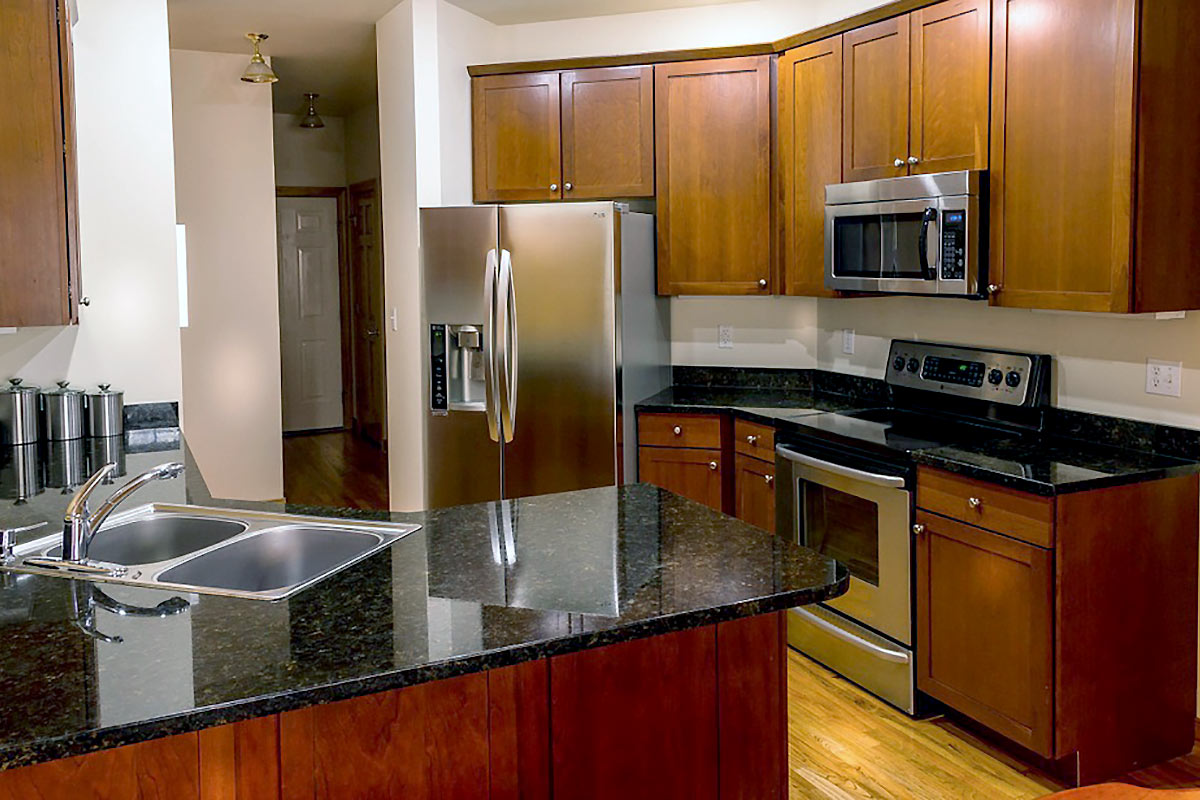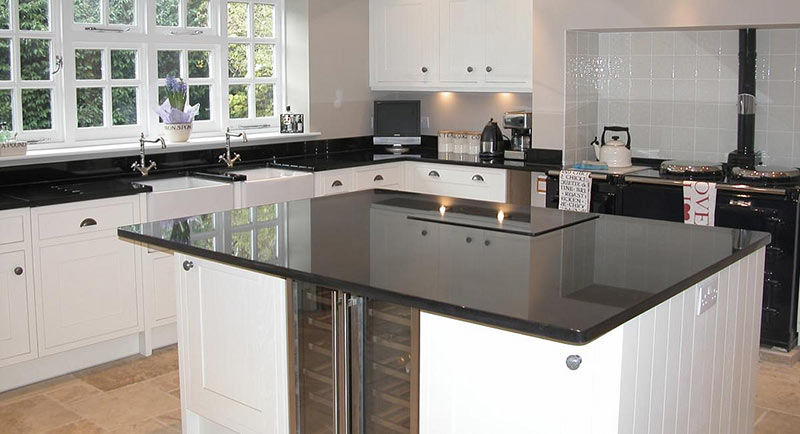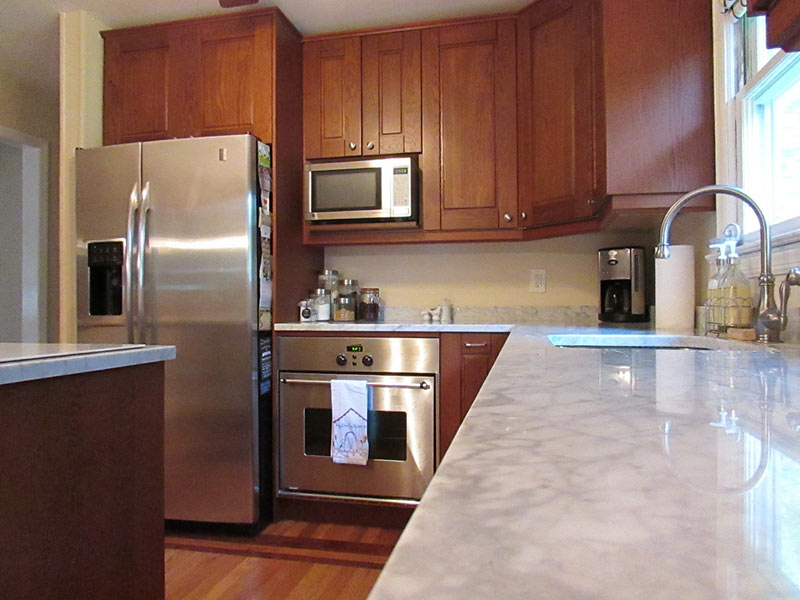
Marble vs. Granite vs. Quartz Worktops: Which Is the Best Worktop Material?
When it comes to worktops, leading materials such as marble, granite and quartz all have their respective advantages and disadvantages. These three worktop materials are pretty much almost similar that homeowners have a difficult time deciding which one is ideal for their home kitchen.
So if you’re planning a kitchen upgrade or planning on buying a new kitchen and unsure what the difference is between marble, granite and quartz worktops, we’ve summarised it down below for you.
The Basics
Let’s start by answering one of the most commonly asked questions: What are marble, granite and quartz?
Marble. This is a natural stone (limestone), and since it is natural and mined, every slab is unique. In general, marble’s colouration is more consistent with a more visible pattern compared with granite.
Granite. Like marble, granite is a natural stone comprising different materials, like mica, quartz and more. Since it is mined, each slab offers distinctive colours and patterns only characteristically unique to granite.
Quartz. Technically, quartz worktops are not entirely a “pure” natural stone. Although most quartz slabs are composed of approximately 92 to 97% natural quartz crystals, the rest of its components are composed of polymer resins and pigments that bind together the crushed crystals. That’s why quartz is most often referred as an “engineered stone.”
Advances in technology allowed the manufacture of quartz surfaces that mimics natural stones like granite and marble. Caesarstone and Silestone are the leading quartz brands that offer stone slabs that resemble marble.
Caesarstone Calacatta Nuvo, for example, features elegant, wide cascading grey veins set on a light blue base. This engineered surface resembles marble, without the required upkeep of a natural stone surface. Meanwhile, Silestone Lagoon is a great alternative to white marble.
The Comparison
Durability
All three materials are widely popular for being hard-wearing. In fact, with proper maintenance, all three surfaces can hold out for more than 20 years, given proper care and maintenance have been practised, of course.
Heat Resistance
Although all three materials are resistant to heat, up to some degree, today’s quartz surfaces have been designed to stand up to extreme temperatures without either cracking or burning, and a good example of this is Dekton. Appliances and hot pans or pots can be directly places on top of this surface without having to worry about leaving burn marks.
Scratch and chip resistance
The softest materials of the three is marble. This means marble can easily be scratched and chipped, while granite comes in second and quartz being the most impervious to scratch and chipping.
Natural?
All three worktop materials are considered “natural” because of the fact that they’re all actually stone. However, only marble and granite can be completely considered as “natural stone”.
Why?
Simply because these two materials do not go through a manufacturing process. As previously mentioned, they’re mined. Meanwhile, quartz is considered an “engineered stone” thanks to the mixture of pigments and resins and crushed quartz crystals.
To some, there isn’t much difference, while others point out “natural” being the only thing that distinguishes these three surfaces.
They would not choose laminate over hardwood floors, so why would buyers opt for engineered stones when there’s natural stone?
Stains and Hygiene
Marble and granite are both porous materials, meaning spilled liquids and food could potentially seep into the pores and then stain the counter.
More vulnerable to common acidic kitchen items like juice and wine is marble. If not properly sealed, those pores could also potentially harbour mould, mildew and bacteria.
On the other hand, quartz is non-porous, thanks to the resins that ensure the non-porosity of the material. This means that quartz doesn’t harbour bacteria or stain. In fact, it is easier to clean compared with the other worktop materials.
Maintenance
Maintenance is one of the major drawbacks of both granite and marble. Since both are natural stones, they are porous, which means periodic sealing is a requirement, which also means additional costs in the long run.
Regular sealing usually is around one to two years, depending on use.
Meanwhile, quartz is an engineered stone, so it doesn’t require regular sealing.
Unique Look
As earlier mentioned, granite and marble are mined; hence, each single slab comes with a unique veining and striation. This only means there will be no other copies of your counters.
If you set your eyes on one particular pattern, you might want to inform your dealer that you need that reserved. Chances are, you’re not going to find anything close to that particular pattern.
On the other hand, quartz is engineered in a particular manner, and the slabs could look similar and possibly could look not as “natural” compared with marble and granite. The colour enhancements mixed during manufacturing add to the appeal of this surface.
Cost
Marble, granite and, yes, even quartz are all more expensive than most concrete, tile, wood or laminate kitchen worktop alternatives, with each having different levels of pricing and quality.
The Verdict
So which is the best worktop material? Marble, granite or quartz?
The simple answer is—there is no one “best” worktop material.
Your budget will likely dictate which material best suits your kitchen. Additionally, your choice would depend on your household’s major concerns and your personal preference.
Quartz worktops. This engineered stone often the budget-friendly option for a number of buyers. It’s also the easiest to clean and maintain and is more hard-wearing compared with granite and marble.
The only drawback is that it doesn’t have the same high-end, natural look that granite and marble have.
Marble worktops. Well, if you’ve already set your mind on marble, then marble is indeed marble. There’s no other substitute for it. Although it might be a little bit expensive, if you feel it is the right material for your kitchen or bathroom, then it is worth the worktop material.
Granite worktops. This natural stone is more expensive than quartz but of course less expensive than marble. Additionally, it’s more durable than marble, but coloration might be not as consistent.
About the Author
The Marble Store specializes in designing and manufacturing the finest quality worktops for their UK consumers. Over 16 years of experience in responding to the unique needs of the stone industry made them one of the grand producers of granite worktops in the country. Now, with the trust of most consumers, they are now able to produce different edge details and finishes that will make most homeowners fall in love with their creations.



